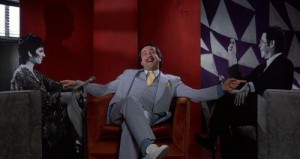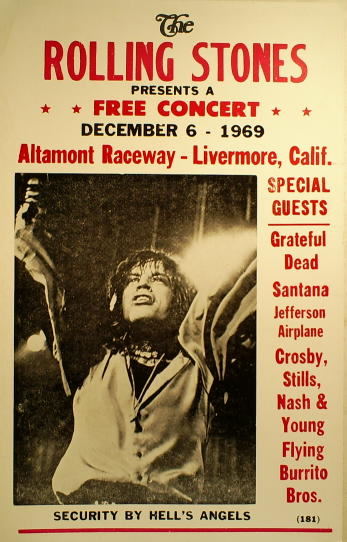We’d hoped this rumor would prove to be untrue, but alas… X-Ray Spex’ teenage dynamo Poly Styrene has lost her battle with breast cancer. May we celebrate the rip-roaring beauty of “Oh Bondage, Up Yours.”
For some reason I just got the urge to look up videos by Fanny, an early ’70s, female-fronted blooz-rock band I’d vaguely heard about for years but never heard a lick of—nor saw. Here’s what I found:
Lord almighty, these gals, led by the sisters Millington, were Heart a few years before the Wilson sisters got their act in gear! OK, they’re lacking the delicate balance of firepower and finesse that would characterize the finest works of Ann and Nancy, but Jean, the bass-playing lead singer’s hair couldn’t be better conditioned and her crocheted vest is to die for! Harmony-singing guitarist June provides the requisite hard-rockin’ support and possibly pioneers the art of head whipping.
Drummer Alice de Buhr doesn’t get enough face time, but I like her no-nonsense approach to fills (see her work during the guitar solo at around the 2:20 mark). The unsung hero of the band, however, may be keyboardist Nickey Barclay. Her passionate organ solo on “Special Care” is the highlight of that song (it turns out she was briefly a member of Joe Cocker‘s Mad Dogs & the Englishman, if that organ part sounds familiar)—and how ’bout that hairdo?
In case you thought these ladies were 2-boogie wonder, here they are on Sonny and Cher’s show (using their drums, no less):
In its continuing quest to be hip, NPR posted this interview with John Maus and entitled it, “The Thrilling, Manic and Utterly Addictive John Maus.”
Mr. Maus makes multiple statements that invite discussion. These are just a few:
- Music of the 1990s was “a goofy mistake.”
- Utopia is “us playing our tapes for each other.”
- “The most radical thing we can do (in making music is to) make it as poppy as possible.”
I’m a fan of electronica and experimental music, but this interview made me want to pull up a rocking chair and join the ranks of E. Pluribus Gergely’s Curmudgeon Club. While some bands of the 1980s, namely Scritti Politti, have also made the argument that pop music can be a form of revolution, Mr. Maus’s babble came across to me as annoying and ridiculous.
I hope you will join me in further discussion of this interview, NPR’s title, and Mr. Maus’s conclusions.


Sounds of the Hall in roughly 33 1/3 minutes!
In this week’s edition of Saturday Night Shut-In Mr. Moderator can’t stop thinking about a recent act of heroism. Then, as the evening progresses, he drifts off into bagism, as he considers taking the episode through the wee hours. Unfortunately this week’s planned hockey talk segment has been postponed, but join us, won’t you?
[audio:https://www.rocktownhall.com/blogs/wp-content/uploads/2011/04/RTH-Saturday-Night-Shut-In-25.mp3|titles=RTH Saturday Night Shut-In, episode 25][Note: The Rock Town Hall feed will enable you to easily download Saturday Night Shut-In episodes to your digital music player. In fact, you can even set your iTunes to search for an automatic download of each week’s podcast.]


It takes a positive touch!
I was recently introduced to a band that featured the use of the bagpipes in the lead guitar role. The person who played me multiple tracks from this record, although dear to me, neglected to let me know that the band also showcased the didgeridoo.
This band struck me as WRONG on so many levels. For the sake of research for The Hall, I looked for this band on YouTube and unfortunately found several videos. They showcased a kilt-wearing, tush-shaking player of bagpipes. The didgeridoo player (who also wore a kilt) doubled as the keyboardist. There were black puffy sneakers and an obliquely designed band logo. There was a rendition of “Amazing Grace.” Lord help me if any of the videos depicted a World Music Iwo Jima.
I’m a bit concerned that I’m becoming overly closed-minded in my advancing age. Bagpipes: they can sound festive, they can sound plaintive, they can sound weird. But in general, when part of guitar/bass/drums combo, they sound (to me) very, very out of place.
This band got me to thinking: Are there rock songs when a bagpipe or didgeridoo is used to positive effect?


Draw the line.
In a recent Dugout Chatter question regarding The Rolling Stones‘ “Emotional Rescue” and “Start Me Up,” Townsman bostonhistorian countered a cop-out charge by quickly cementing his place as Mr. Moderator’s Newest Hero. Although Mr. Mod is well aware that this is may not be a title to which many Townspeople aspire, he felt the rock ‘n roll record needed to acknowledge bostonhistorian’s complete dismissal of the Stones’ post 1970 career with a posting of his full opinion on The Main Stage. This dramatic turn of events can be traced beginning here. The astounding final blow of bostonhistorian’s defense follows:
For real. They should have packed it up after Altamont and the release of Let It Bleed, which both happened in December of 1969. Think about this: what if the last thing anyone ever heard out of the Rolling Stones was “You Can’t Always Get What You Want”, and then think about the self-parody which follows. Does anything after Let It Bleed add to their reputation, or diminish it? There’s nothing on Exile as good as the best songs off Let It Bleed, and Let It Bleed also had a tiny bit of cultural relevance. After that, it’s a haze of drugs and navel gazing. I’ve gone on the record as characterizing Mick’s vocals on Exile as Amos and Andy-like, and I find the whole album turgid. Of course Mick and Keith could still write songs, but to what end?
“I admire not only the panache of bostonhistorian’s definitive stance on the subject,” said Mr. Moderator, while departing his colonial home for a drive into the office this morning, “but its moral underpinnings.”
Mr. Moderator went on to add that although he feels the Stones produced another half dozen highly worthy songs following Altamont, including a few from the band’s years matched up against prime Rod Stewart and perhaps his second-favorite Rolling Stones song, “Beast of Burden,” he fully backs the spirit of bostonhistorian’s opinion and is “admittedly deeply envious” of his staking out this position first.

